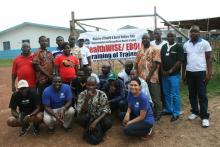Experts to assess mental health impact of Ebola
Monrovia, June 6, 2015 -- During the Ebola outbreak in Liberia, about 400 health workers were infected with the virus and more than half died. Now in the post-Ebola environment, the health and safety of health workers is a top priority.
Following up, the Ministry of Health, in collaboration with the World Health Organization (WHO), recently carried out training of key health workers who interface with the handling of every aspect of infectious diseases – Environmental Health Technicians (EHTs). From handling Ebola-tainted waste to guiding staff on appropriate PPE, EHTs are at the frontlines and have the potential to directly mitigate the effect of deadly pathogens on health workers. The primary objective of the training was to enhance the knowledge and capacity of health workers on basic EOHS services in Health Care Facilities (HCFs) at the county level.
The 2-day training program was carried out in 3 phases. Phase 1 took place in Montserrado County in February 2015 with the training of EHTs, Community Health Department Directors (CHDDs) and Case Managers in 7 counties: Bomi, Gbarpolu, Grand Bassa, Grand Cape Mount, Margibi, Montserrado and Rivercess. Phase 2 took place in River Gee County in April 2015 with the training of EHTs in Grand Gedah, Grand Kru, Maryland, River Gee and Sinoe counties.
Phase 3 took place in Bong County in June 2015 with the training of EHTs and CHDDs in Bong, Lofa and Nimba counties. The curriculum of the training program focused exclusively on Environmental and Occupational Health and Safety (EOHS), including safe infection practices. The WHO/International Labour Organization’s manual HealthWISE: Work Improvement in Health Services was used as a resource. A total of 66 health workers were trained, with the program beginning with a pre-test and ending with a post-test. There was significant improvement in knowledge of environmental and occupational health practices based solely on test scores.
Bong County Health Officer Dr. Samson K. Arzoweuoi, in his opening remarks, welcomed the participants in Gbarnga (Bong County):
“Ebola has taught us so many lessons. One of these is to always maintain a strong focus on occupational health and safety. Now that we are beginning to fully realize the importance of this area, I am very delighted to see that this workshop has materialized.”
In the wake of the Ebola epidemic, proper mixing and use of chlorine was highlighted, through review, interactive sessions and pre- and post-testing. Additional environmental content included approaches to control water quality, quantity and treatment; sanitation and hygiene; and healthcare waste. The sessions were interactive and robust.
Dr Mona Khanna, WHO Liberia’s National Coordinator on Occupational Health and Safety and one of workshop facilitators, was impressed by the level of involvement demonstrated by the participants.
“These managers were so actively involved during our interactive sessions. They soaked up the information like a sponge,” she said.
Work-related health problems result in an economic loss of 4–6% of GDP for most countries, and annually 12.2 million people, mostly in developing countries, die from non-communicable
diseases while still of active working age. Health workers worldwide are exposed to a number of hazards on a daily basis. These occupational risks include physical hazards such as slips, trips and falls, noise and radiation; ergonomic hazards like heavy lifting and biological hazards such as tuberculosis, hepatitis, and Ebola. Trainees were coached as to the proper execution of the hierarchy of controls process to address work hazards.
The training included a practicum component as well as didactic sessions. On the second day of the workshop, the participants were given the opportunity to put theory into practice during field visits to local hospitals and health care facilities. During visits to Fish Town Health Center, Fish Town Hospital, C.B. Dunbar Hospital and Phebe Hospital, they assessed vermin, water, sanitation and waste management; storing and management of equipment and supplies; and food security.
At the end of the training, each participant created and presented forward action plans for their own counties to improve environmental practices and workplace safety and to reduce occupational health hazards.
James V. Juman, EHT in Bong County, hopes to see similar programs in the future.
“I really enjoyed the workshop. Especially when it comes to the aspect of waste management, food safety, and workplace safety, I learned a lot. This is one of the best workshops we’ve ever had,” he said.




